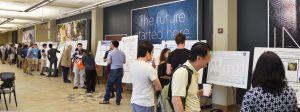Workshop Final Report

Executive Summary:
The Workshop on Materials Computation, held at the NCSA building on the UIUC campus, featured eight distinguished invited speakers and more than 100 participants over two days, from August 14 to 15, 2017. UIUC participants included graduate students, postdoctoral researchers, and faculty from seven departments and multiple institutes. Among the other attendees were research staff and program officers from the Army Research Lab (ARL), the Office of Naval Research (ONR), the National Science Foundation (NSF), and a number of industry guests.

The major themes of the oral presentations and posters were multiscale modeling and data science in computational materials. Specific topics included algorithms for many-body and first principles materials computation, semi-empirical and empirical atomistic modeling of materials, strategies for fitting of potentials and curation of materials datasets, modeling methods for bridging multiple time scales and length scales, challenges of modeling materials microstructure, computational science for energy materials, and uncertainty quantification in materials modeling.
In addition to invited oral presentations and a stimulating and interactive poster session, with brief oral introductions for many of the posters, the workshop included significant time for interactions during lunches, coffee breaks, and an invited workshop dinner. The program also included a tour of the National Petascale Computing Faculty, also known as the “Blue Waters” supercomputer, as well as vision talks by NCSA Director Bill Gropp and Materials Research Laboratory Director Paul Braun.
Program:
The eight invited lectures spanned the two days of the workshop program, and provided a framework for the major themes of the workshop. The lectures were recorded, and are available for streaming at the links below, in the order of presentation at the workshop.
Introductory remarks, Harley Johnson, University of Illinois, Urbana-Champaign: mediaspace video
Bill Gropp, Director of NCSA: mediaspace video
Lecture #1: Shiwei Zhang, College of William and Mary
Inside materials computation — the many electron problem: mediaspace video
Lecture #2: Ryan Elliott, University of Minnesota
OpenKIM: Tested portable interatomic models for molecular and multiscale simulations: mediaspace video
Lecture #3: Danny Perez, Los Alamos National Lab
Leveraging massive parallelism to extend atomistic simulation timescales: mediaspace video
Lecture #4: Somnath Ghosh, Johns Hopkins University
Spatial and Temporal Multiscale Models for Addressing the Integrated Computational Structure-Materials Engineering Initiative: mediaspace video
Lecture #5: Logan Ward, University of Chicago
Materials Data Facility: A distributed model for the materials data community: mediaspace video
Lecture #6: Maria Chan, Argonne National Lab
Understanding and improving renewable energy materials by combining experimental characterizing, first principles modeling, and data science: (video unavailable)
Lecture #7: Stephen Foiles, Sandia National Lab
Using molecular dynamics to understand the complexity of grain boundaries: mediaspace video
Lecture #8: Alejandro Strachan, Purdue University
Molecular dynamics exploration of new materials and phenomena – how can we quantify uncertainties?: mediaspace video

Conclusions:
The workshop topics, multiscale modeling and data science, reflect current issues in computational materials. Participants discussed these themes throughout the workshop, and several overarching conclusions emerged:
- Materials data is a resource both for linking of scales in modeling and validation of computational predictions.
- Uncertainty quantification of predictions is crucial for meaningful validation, and UQ across scales is an important challenge.
- Significant data science issues exist for studies of defects, even when working at a single scale.
- Scale-bridging continues to be an important theme in materials modeling, that requires different researchers to work together.
Other conclusions of the workshop discussions:
- Researchers continue to benefit from opportunities to work closely with one another, especially in developing new algorithms and codes for computational modeling of materials.
- Access to petascale and future exascale computing facilities continues to be essential for computational materials researchers. Current state-of-the-art methods include some algorithms there are massively parallel, and other algorithms that are more memory intensive.
- Computational materials will continue to move toward development and sharing of software, and away from specialized codes.

Acknowledgements:
The workshop program was made possible through generous support from the UIUC College of Engineering Strategic Research Initiatives (SRI) program. The National Center for Supercomputing Applications (NCSA) played host to the workshop, and generously provided technical support and space to accommodate the lectures, posters, and lunches. Ms. Holly Foster of the Department of Mechanical Science and Engineering supported all aspects of the planning and logistics.